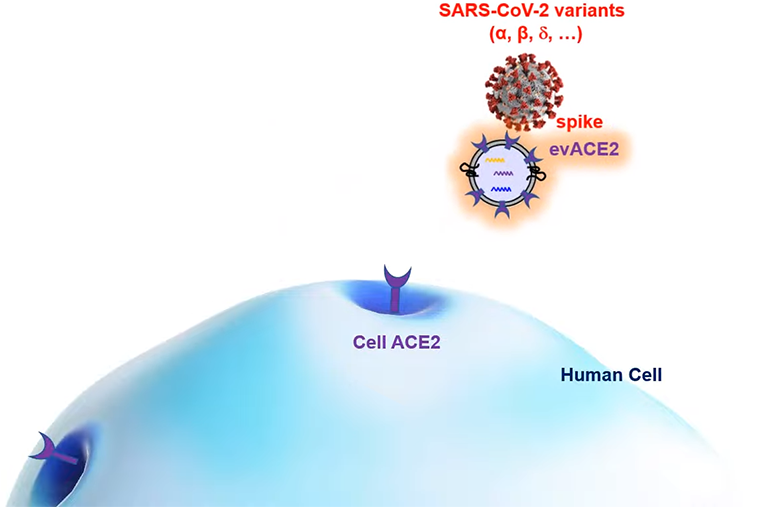Northwestern University researchers have discovered naturally occurring extracellular vesicles in the blood that contain the ACE2 protein, which is the cellular target of SARS-CoV-2. The vesicles act as a binding site for virus particles in the body, preventing them from attaching to and infecting cells. Unlike vaccines, therapeutics based on this finding are unlikely to be affected by changes in future variants of the virus because they are based on the target site in the body and not the virus itself. The research team hopes to further develop the nanostructures into a therapeutic that could be administered as a nasal spray.
Our weapons against SARS-CoV-2 are constantly evolving, thanks in large part to tremendous efforts by scientists during the pandemic. From vaccines to antiviral drugs, we have developed numerous approaches that attack the virus itself. However, this latest approach takes some of the body’s defenses in the form of a naturally occurring decoy that binds viral particles and prevents them from attaching to cells.
The basis for this proposed technology are naturally occurring extracellular vesicles present in the blood during SARS-CoV-2 infection, which appear to increase in number with more severe infections, presumably as an escalation of the body’s antiviral response.
The researchers named these vesicles “evACE2” because they contain the ACE2 protein, which is the protein target of the virus in our own cells. Fortunately, the virus isn’t finicky about where it binds to the protein, and will harmlessly bind to the protein if it’s present on the evACE2 nanobubbles while they’re floating in the blood. Interestingly, the use of such nanovesicles as an antiviral therapeutic has a distinct advantage: they are unlikely to become obsolete once the virus mutates.
“Whenever a new mutant strain of SARS-CoV-2 surges, the original vaccine and therapeutic antibodies can lose potency against alpha, beta, delta, and the latest omicron variants,” said Huiping Liu, a researcher on the study involved researcher. “However, the beauty of evACE2 is its superpower in blocking broad strains of coronaviruses, including the current SARS-CoV-2 and even future SARS coronaviruses, from infecting humans.”
So far, the researchers have shown that the vesicles can bind and inhibit the virus in vitro, and they showed that the vesicles were 135-fold more effective at blocking the binding of the viral spike protein compared to the ACE2 protein alone. The vesicles also protected laboratory mice from lung damage and death during SARS-CoV-2 infection.
Another benefit of evACE2 is that since they already occur naturally in the body, they are likely to be well tolerated as a treatment and are unlikely to be inherently toxic when administered. The next challenge for these researchers is to create such vesicles in the laboratory and determine a route of administration. So far, the Northwest team suggested that a nasal spray could be a good way to deploy the vesicles.
See a schematic video of the vesicles in action below.
Studying nature communication: Circulating ACE2-expressing extracellular vesicles block broad strains of SARS-CoV-2
Over: Northwest University
